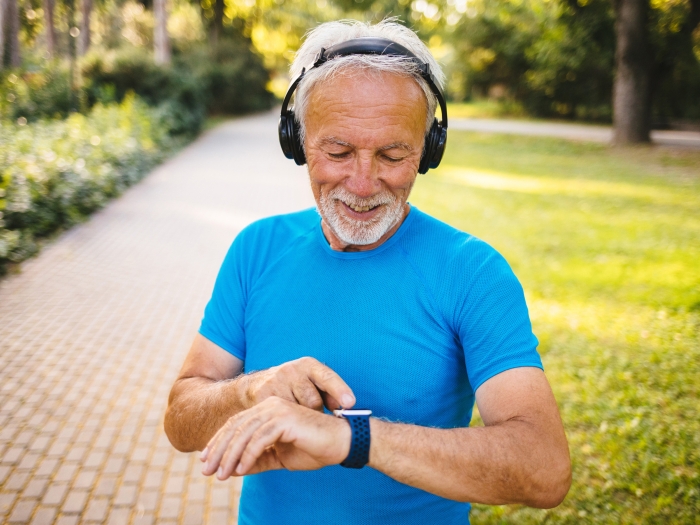Future research will determine which types of messages are most effective and for which groups of patients
5:00 AM
Author |

Nearly one in three Americans wear a wearable device, like a smartwatch, to track their health and fitness.
Studies have shown positive effects of increasing movement in ways that can be measured by these devices, especially for people who recently had a heart attack or other cardiovascular event.
But a Michigan Medicine-led report shows that adding a mobile health application to such devices yields mixed results. Tailored text messages to encourage high-risk people to move more may improve some short-term outcomes but don't always improve physical activity levels for everyone.
The randomized clinical trial, called the Virtual AppLication-supported Environment To Increase Exercise Study, or VALENTINE, compared the physical activity levels of patients enrolled in cardiac rehabilitation who received the mobile health intervention to those who did not.
Cardiac rehabilitation is a medically supervised program is recommended after cardiovascular events, such as heart attack or surgery.
Of the more than 200 participants in the study, half were provided a mobile health intervention that consisted of an application that allowed for activity tracking and goal setting, as well as tailored, just-in-time text messages to promote physical activity.
The messages accounted for factors such as the weather, time of day, or day of week to ensure that they were highly relevant to a participant’s environment.
Results, published in npj Digital Medicine, reveal no significant increase in physical activity levels for patients enrolled in cardiac rehabilitation receiving the mobile health intervention across all smartwatch types.
SEE ALSO: Increased step count linked to better health for people with heart failure
There was, however, a significant increase in walking distance over six minutes, a measure of functional capacity, three months after study initiation for Fitbit users, though this was not sustained at 6-months.
There was not significant change in six-minute walk distance at six months for Apple Watch users.
“Overall, this study suggests that the intervention did not have a long term impact on physical activity that was sustained over time but may have intermediate or potentially device-specific effects,” said first author Jessica R. Golbus, M.D., clinical instructor of internal medicine-cardiology at University of Michigan Medical School and member of the Precision Health initiative.
“Further analyses will help us to determine which types of tailored text messages are most effective and for which groups of patients. We will then use that information to design and deliver a future digital health intervention in which participants receive only the most effective text messages,” Golbus said.
“This study is a first step in us understanding how best to use these new technologies to the benefits of patients.”
Additional authors include Rachel Stevens, V. Swetha E. Jeganathan, MBBS, MRCS, Evan Luff, Jieru Shi, Walter Dempsey, Ph.D., Bhramar Mukherjee, Ph.D., Sarah Kohnstamm, M.D., Predrag Klasnja, Ph.D., Sachin Kheterpal, M.D., Brhmajee K. Nallamothu, M.D., all of University of Michigan, Kashvi Gupta, MBBS, M.P.H., of University of Missouri Kansas City, Thomas Boyden, M.D., of Spectrum Health, Vlad Taralunga, B.S.E., and Vik Kheterpal, M.D., both of CareEvolution, and Susan Murphy, Ph.D., of Harvard University.
Golbus receives funding from the NIH (L30HL143700, 1K23HL168220-01) and receives salary support by an American Heart Association grant (grant number 20SFRN35370008). Nallamothu is a principal investigator or co-investigator on research grants from the NIH, VA HSR&D and the American Heart Association. Vik Kheterpal is a Principal and employee of CareEvolution. Taralunga is a Software Architect employed by CareEvolution.
Paper cited: “A randomized trial of a mobile health intervention to augment cardiac rehabilitation,” npj Digital Medicine. DOI: 10.1038/s41746-023-00921-9

Explore a variety of health care news & stories by visiting the Health Lab home page for more articles.

Department of Communication at Michigan Medicine
Want top health & research news weekly? Sign up for Health Lab’s newsletters today!





